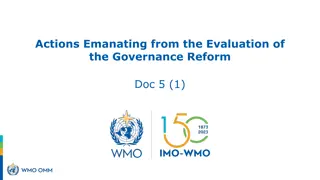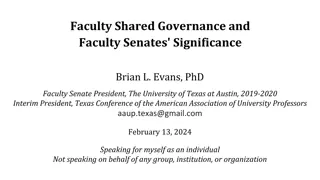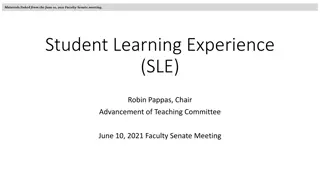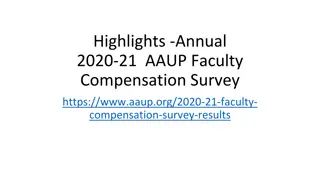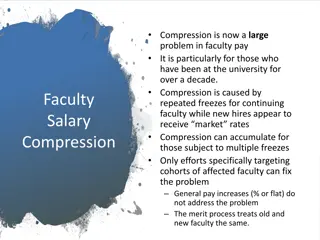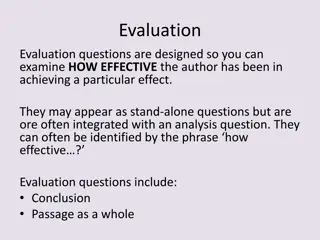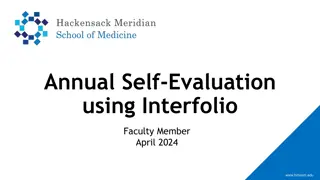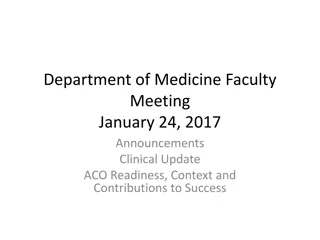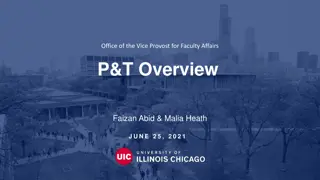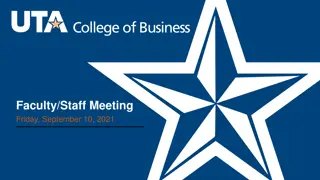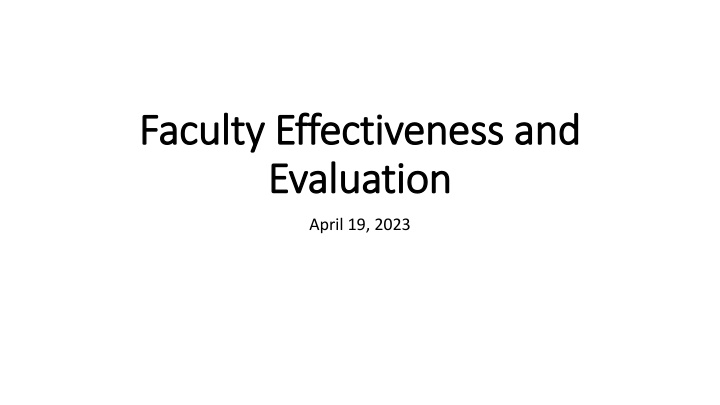
Faculty Evaluation Process and Importance of Appraisals
Explore the significance of evaluating faculty members, including recognizing achievements, fostering communication, setting improvement plans, and meeting accreditation requirements. Learn about the timeline and responsibilities in the faculty evaluation process to ensure a fair and structured assessment.
Uploaded on | 0 Views
Download Presentation

Please find below an Image/Link to download the presentation.
The content on the website is provided AS IS for your information and personal use only. It may not be sold, licensed, or shared on other websites without obtaining consent from the author. If you encounter any issues during the download, it is possible that the publisher has removed the file from their server.
You are allowed to download the files provided on this website for personal or commercial use, subject to the condition that they are used lawfully. All files are the property of their respective owners.
The content on the website is provided AS IS for your information and personal use only. It may not be sold, licensed, or shared on other websites without obtaining consent from the author.
E N D
Presentation Transcript
Faculty Effectiveness and Faculty Effectiveness and Evaluation Evaluation April 19, 2023
Why evaluate faculty? Recognize and value what the employee has accomplished and the impact on the department and university Allow a structured time for employee and supervisor to communicate openly about job performance, present job responsibilities, expectations and other issues Identify a plan that the employees can use to improve performance; if necessary, identify training/educational needs and/or plan objectives/goals for the future Accreditation requirement
Reminder A personnel appraisal is a legal document. Anything written in the performance appraisal may become public/used in court Anything not written in the evaluation that should be written also may be used in court You must be honest and fair Be encouraging but also provide needed constructive criticism 3
Faculty Evaluation Process and forms Timeline Criteria and ratings
Faculty Evaluation Process Event Responsible person Timing VP Faculty Affairs sends evaluation forms and reminders to faculty and department chair/program directors VP Faculty Affairs/ Provost Early May Faculty members log their annual activities in Watermark Faculty Success All full-time ranked faculty All year; completed by end of May Faculty members run Rapid Report titled Faculty Annual Review; be sure to use the correct dates for the current academic year (7/1/22 to 6/30/23) All full-time ranked faculty June 1 Save report and email to department chair/program director All full-time ranked faculty June 1
Faculty Evaluation Process Event Responsible person Timing Schedule 30-45 minute evaluation meeting Department chair/program director By June 1 Complete faculty evaluation form sent by VPFA, using evidence from Faculty Annual Review and other sources of evidence Department chair/program director During June Meet to review the evaluation form and discuss performance Department chair/program director and full-time ranked faculty member By July 1 Send completed & signed evaluation form to dean Department chair/program director By July 15 Review forms; sign and send to VPFA Dean By August 1
Faculty are evaluated on: Teaching Scholarship/research/creative activity Service Administration (if compensated for administrative work by a stipend and/or TCs)
Sources of evidence: teaching Evidence presented in Faculty Annual Review AND Student course experience data ( student evaluations ) Teaching observations Review of syllabi for currency and coherence Others listed in Faculty Handbook
Sources of evidence: research/scholarship Only use evidence presented in Faculty Annual Review Look for completed scholarly products that are PEER REVIEWED Minimum standard is 1 peer-reviewed scholarly product (e.g. paper, conference presentation) every 2 years Anyone not meeting that standard MUST receive a rating of needs improvement or unsatisfactory (unless on the 30 TC teaching-intensive model) Do not accept more than one year of plans/ideas/thoughts/promises Do not accept excuses (Covid, overloads, general busyness) WE REQUIRE ACTUAL PRODUCTS
What is NOT a peer-reviewed scholarly product? For faculty members working on terminal degrees/doctorates, the only requirement is satisfactory progress toward completion. Do not let them get stuck! Conference attendance Ideas and plans Promises to work on scholarship this year Attending chapel or Bible Study Taking students abroad
Sources of evidence: service Only use evidence presented in Faculty Annual Review Service to CUWAA: can be department/program, school, university-level Service to community/public Service to profession Academic advising and mentoring See faculty handbook for expectations based on the faculty member s rank (e.g. more leadership is expected as rank increases) Look for evidence of accomplishment, not just membership
Sources of evidence: administration Look for evidence of accomplishment in the administrative role; this may be included with service in the Faculty Annual Review
Performance Rating Categories Exceptional Consistently exceeds; above and beyond; shows initiative Professional Meets expectations; THIS IS A GOOD CATEGORY! most individuals should fall into this category Needs Improvement Late, inconsistent, unreliable; low student ratings; little or no scholarship and no plan; no progress toward doctorate May need PIP Unsatisfactory Avoidance of responsibility for poor performance; consistently poor student ratings; unwilling to accept feedback/correction PIP Required 13
Exceptional Exceptional: Consistently exceeds expectations for a faculty member holding this rank; achievessignificant results and has a consistently positive impact; seeks additional responsibility to serve the university; sought out as authority, expert and/or mentor to others. Consistently outstanding teaching performance that challenges students appropriately, effectively connects faith with the academic discipline, has many peer-reviewed scholarly publications/presentations, and/or has an exceptionally high level of service. The faculty member also exceeds the requirements described in the faculty handbook by providing an exceptional level of availability and responsiveness to students.
Proficient Proficient: : Meets expectations for a faculty member holding this rank; has positive impact; assumes responsibility and shows initiative; results occasionally exceed expectations. The faculty member is a good teacher, connects faith with the academic discipline, meets the scholarship requirements in the faculty handbook, and provides service as defined in the handbook. If the faculty member is enrolled in a doctoral program, he/she is making steady progress toward the degree. The faculty member also meets the requirements described in the faculty handbook with respect to availability and responsiveness to students, holding office hours, and for attending meetings, graduations and other university events. Most faculty members work will fall into this category.
It is not an exact science Proficient is awesome Proficient rating is designed to prepare faculty for advancement in rank, but remember that the Rank and Promotion Committee/Peer Review Committee makes the decision (not administration)
To be exceptional in Teaching: Student ratings are uniformly and consistently 4.8-5.0 (all courses, all terms, all modalities) Student comments describe a superb learning experience Faculty member regularly seeks and incorporates constructive critical feedback from CELT, department chair/program director, dean, and/or colleagues Faculty member consistently demonstrates and documents positive changes in teaching based on feedback; is always improving Faculty member demonstrates great depth and substance with respect to course content
To be proficient in Teaching: Student ratings are in the 4 s Student comments are overall positive Faculty member accepts responsibility for, and takes ownership of, any problems/issues (no defensiveness, excuses or blame-shifting) Faculty member has sought out constructive critical feedback from CELT, department chair/program director, dean, and/or colleagues Faculty member can demonstrate and document positive changes in teaching based on feedback Faculty member demonstrates currency with respect to course content
To be proficient in Teaching: Syllabus and course assignments contain appropriate content and academic rigor Each learning activity and assignment/assessment fulfills at least one course objective Each learning activity and assignment/assessment has a purpose that students understand Course is well-organized Communication with students is clear Student feedback is prompt and meaningful
To be exceptional in Research/Scholarship: Multiple peer-reviewed research products in a single year (3+; some faculty have more) Consistent and ongoing record of peer-reviewed products Robust & consistent research agenda leading to above Multiple grants submitted and some funded Recognized expert in field of inquiry Numerous invited presentations on research topic
To be proficient in Research/Scholarship: One peer-reviewed scholarly product every other year (Product = academic conference presentation, journal article, book chapter, funded research grant, invited presentation) OR Demonstrated progress toward a peer-reviewed scholarly product (Literature review completed, grant submitted, data collected, etc.) Plans and goals are tools to help you achieve a product; faculty must have something specific to demonstrate progress
To be proficient in Research/Scholarship: Enrolled in doctoral program in required timeframe Making steady, demonstrable progress toward doctorate Completion of doctorate within required timeframe Publish doctoral work in peer-reviewed academic journal
To be exceptional in Service: Significant leadership roles in department, school and/or university committees with demonstrated accomplishments Leadership roles in professional organizations or church committees/boards; highly active and a leader in state or national capacity Significant service to church or community; regular and substantial involvement in providing service to others Significant leadership in academic activities (e.g. HLC accreditation, professional accreditation) (If you run a private business, you cannot count it as service to the university)
To be proficient in Service: Active service on department, school and/or university committees (includes search committees, ad-hoc committees etc.) Advisor to student organizations Active membership and service in professional organizations or church activities (e.g. Sunday school teacher, board member) Consistent engagement in academic activities (assessment, curriculum development) outside of one s own individual courses ..Demonstrated by evidence of specific accomplishments
Citizenship: everyone is expected to: Turn in final grades on time Take attendance and record in attendance tracker Participate actively without griping in student visit days Attend commencement, opening service, faculty summit Hold final exams at days/times/places specified by registrar Communicate positively and proactively with colleagues and students Attend chapel regularly Use outlook calendar to schedule meetings; keep calendar current Attend faculty meetings and be a positive, constructive voice
Part of the process should be: Finding out what the faculty member needs and wants from their vocation at CU Referring faculty members to resources that can help them grow: CELT, ORSP, mentor, etc. Providing positive feedback to those who are doing well! Seeking feedback on your own performance* as chair/director from the faculty *and then putting their suggestions into practice 26
Needs Improvement Needs Improvement: Often does not meet job expectations; has limited positive impact; is late or inconsistent; unreliable. May have low student ratings in some courses, perform little scholarship, not respond adequately to students or provide them with regular timely feedback, and/or may fail to attend some faculty meetings, graduations, or other required events including office hours. If the faculty member should be enrolled in a doctoral program, the faculty member is not enrolled or is not progressing toward the degree. If a faculty member s work in teaching, scholarship, or service falls into this category, this performance assessment must include a clear description of the improvement needed.
Needs Improvement or Unsatisfactory? Performance Improvement Plan (PIP) DOCUMENTATION!!!! Talk to Leah Dvorak, Academics, or Kim Masenthin, HR, for guidance Plan must include specific goals for improvement It is not a contract 28
Resources to support faculty Teaching CELT programs New faculty mentor New faculty orientation and first-year new faculty programming Professional development funds from provost office (pedagogy) CITG grants
Resources to support faculty Research/Scholarship ORSP (Office of Research and Sponsored Programs) Professional development funds from provost office CIRG grants Faculty Scholarship Committee Year 3 faculty programming
New faculty programming Year 1: Teaching and orientation to the role of a Christian professor Year 2: Faith and learning; LCMS mission and identity Year 3: Curriculum and assessment; research and grants
Disabilities Faculty with a disability must fulfill their obligations to the university: they are still accountable for their work If an accommodation is needed, the employee must work with HR to get that accommodation in place in order to get their work accomplished Without an accommodation from HR, please do not modify your expectations
No evaluation system is perfect Concordia University Wisconsin is a Lutheran higher education community committed to helping students develop in mind, body, and spirit for service to Christ in the Church and the World We are accountable for the quality of the learning we provide We are open to constructive feedback/suggestions to improve our process We are doing this as part of the commitment to our mission 33
Questions? 34

